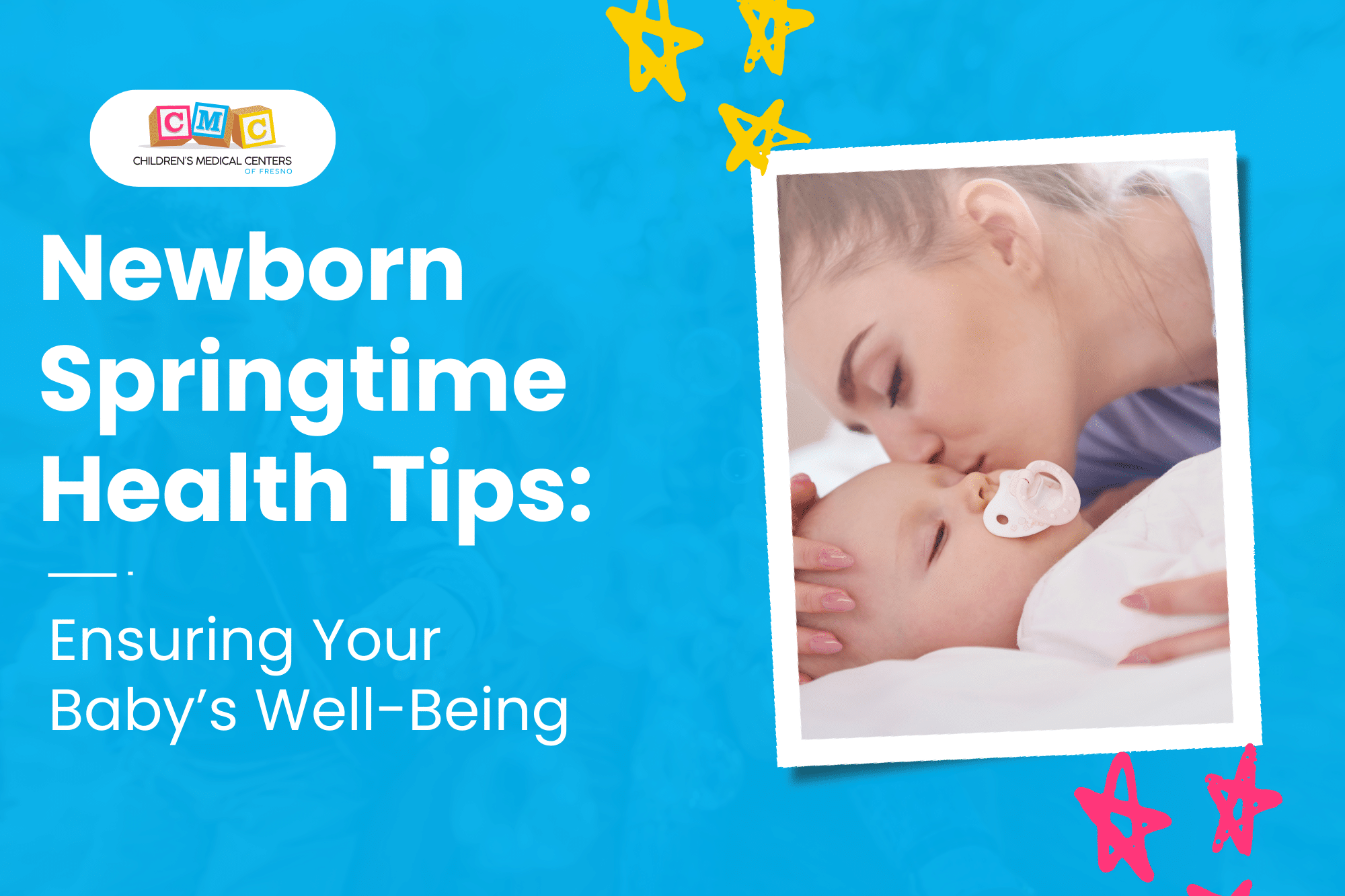Spring is always full of charm—longer days, blooming flowers, and plenty of reasons to head outside with your little one. But along with all that beauty come things like pollen, shifting temperatures, and some health concerns that affect newborns with extra-sensitive skin and developing immune systems.
At CMCFresno, we understand how much you want to keep your baby safe, cozy, and healthy through every season. That’s why we’ve rounded up some gentle, expert-backed tips on spring safety for babies to help you enjoy spring with your little one filled with confidence and peace of mind.
Wrap Your Newborn in Springtime Safety
Watch Out for Spring Allergens
While newborns are too young to develop seasonal allergies, it’s still important to be mindful of spring allergies in babies. They can still be sensitive to environmental irritants like pollen, dust, and mold spores that may cling to your clothes, hair, and skin and get to your baby through close contact.
Even though your little one may not be sneezing from hay fever, they might still react to allergen exposure in more subtle ways. That’s why a few simple habits can make a big difference in protecting your child’s health and keeping them comfortable this season.
Here are some ways to reduce allergen exposure at home:
- Change clothes and wash hands after going outside: Pollen and other allergens love to hitch a ride on fabric and skin. A quick change and rinse can help keep those irritants away from your baby.
- Keep windows closed on high pollen days: While fresh air feels great, it can carry unwanted allergens inside. Instead, use a fan or air conditioner to keep rooms cool and air flowing.
- Use a HEPA air purifier in your baby’s room: An air purifier with a high-efficiency particulate air (HEPA) filter helps capture tiny particles floating in the air, creating a cleaner and more breathable space.
- Wipe down pets before they come inside: If you have furry family members, they might bring pollen on their coats.
Watch for signs that your newborn might be reacting to allergens. Early symptoms of infant allergies can include:
- Sneezing or coughing
- Watery or red eyes
- A stuffy or runny nose
- Mild skin irritation or rashes
- Fussiness without a clear cause
Dressing Your Baby for the Weather
Dressing your baby for shifting temperatures can be one of the trickiest parts of spring. One minute, it’s warm and sunny; the next, it’s breezy and cool. Newborns can’t regulate their body temperature as adults can, so they need extra help staying cozy without overheating. Knowing how to protect newborns in spring starts with smart layering.
Here’s how you can dress your baby for spring weather:
- Start with a soft, breathable base layer like a cotton onesie.
- Add a long-sleeve top or lightweight sweater, depending on the temperature.
- Top it off with a jacket or blanket if it’s cooler outside, especially in the mornings or evenings.
- Use breathable fabrics like cotton or bamboo. These materials help your baby stay comfortable without trapping too much heat.
Protecting Your Baby’s Sensitive Skin
Spring sunshine may feel gentle, but even mild UV rays can be harsh on newborn skin. Because your baby’s skin is thinner and more sensitive, it needs extra care this time of year.
If your baby is under six months old, the safest way to protect them from the sun is to keep them in the shade and dress them in lightweight, long-sleeved clothing. A wide-brimmed hat and stroller canopy also help block the sun without overheating your little one.
For babies six months and older, you can start using baby-safe sunscreen. Choose one that is:
- Broad-spectrum (protects from both UVA and UVB)
- Mineral-based (like zinc oxide or titanium dioxide)
- Fragrance-free and hypoallergenic
Make sure to apply it on small exposed areas like the face and backs of hands, and reapply as directed.
What about spring skin flare-ups?
Springtime can also bring dryness, irritation, or even eczema. Here’s what you can do if your baby has sensitive or reactive skin:
- Use a gentle, pediatrician-recommended moisturizer after baths (as needed).
- Avoid long baths and use warm (not hot) water.
- Dress your baby in soft, breathable fabrics to prevent rubbing or overheating.
If you notice red patches, rough spots, or signs of discomfort, reach out to your Fresno pediatrician to find the best soothing routine.
How to Stay Safe Outdoors with Your Baby
Once your baby is fed and cozy, you might wonder, “Is it okay to take my newborn out for some fresh air?” The answer is yes! With the proper precautions, spring can be a beautiful time to introduce your baby to the outside world. If you’re looking for tips for keeping newborns healthy in changing weather, these outdoor routines can help:
- Start with short trips to quiet places like your backyard, a shaded park bench, or a peaceful walking path. Avoid direct sunlight and always bring a sun hat or canopy for shade.
- Avoid crowded spots during allergy season or when spring colds are going around.
- For bug protection, skip sprays and lotions. Instead:
- Use mosquito nets over the stroller or baby carrier.
- Dress your baby in light, full-coverage clothing when you’re near grass or water.
- Check your baby’s skin after outings for bites or irritation.
Springtime Illnesses to Watch Out For
After those fun outdoor moments, stay alert for common illnesses that tend to pop up this season. Protecting your newborn from seasonal illnesses means knowing what to watch for and taking simple precautions.
Keep an eye out for:
- Mild colds or respiratory viruses which are common as the weather shifts.
- Allergy-like symptoms in older infants, such as sneezing or watery eyes, especially if there’s a family history of seasonal allergies.
Call your pediatrician if you notice:
- Fever over 100.4°F in babies under 3 months
- Persistent cough or wheezing
- Trouble feeding or fewer wet diapers
- Unusual fussiness or fatigue
Follow these healthy habits to prevent illness:
- Wash your hands often, especially before feedings or diaper changes.
- Wipe down pacifiers, bottles, and toys regularly.
- Keep your baby away from sick visitors—even if symptoms seem mild.
While the seasons change, one thing stays the same: Your baby’s well-being matters most. At CMCFresno, we’re proud to offer trusted pediatric care in Fresno, CA, whenever you need reassurance or support.
Enjoy a Safe and Healthy Spring with Your Little One
Spring is a sweet time to make memories with your baby—sunny strolls, fresh air, and those tiny smiles that make it all worthwhile. With extra care and a few simple habits, you can keep your little one safe, comfy, and thriving all season long.
If you have questions or need extra guidance, our caring team at CMCFresno is here for you. From baby health tips for new parents to trusted newborn care advice, we will walk you through every milestone and challenge. Feel free to schedule a visit with one of our pediatricians or call us today at (559) 455-1500.
Turn Springtime Snuggles Into Healthy Milestones
Frequently Asked Questions
- How do I tell if my baby is overheating in spring layers?
Feel the back of their neck or chest—not their hands or feet. If sweaty, flushed, or fussy, remove a layer.
- Is baby acne worse in spring?
Sometimes. Warmer weather can cause baby acne to flare up. Stick to gentle cleansing with warm water and avoid lotions or oils unless recommended by your provider.
- Can insects harm my newborn during spring?
Mosquitos and other bugs may carry risks. Don’t use insect repellent on babies under two months; use stroller nets and avoid standing water or heavily wooded areas.



